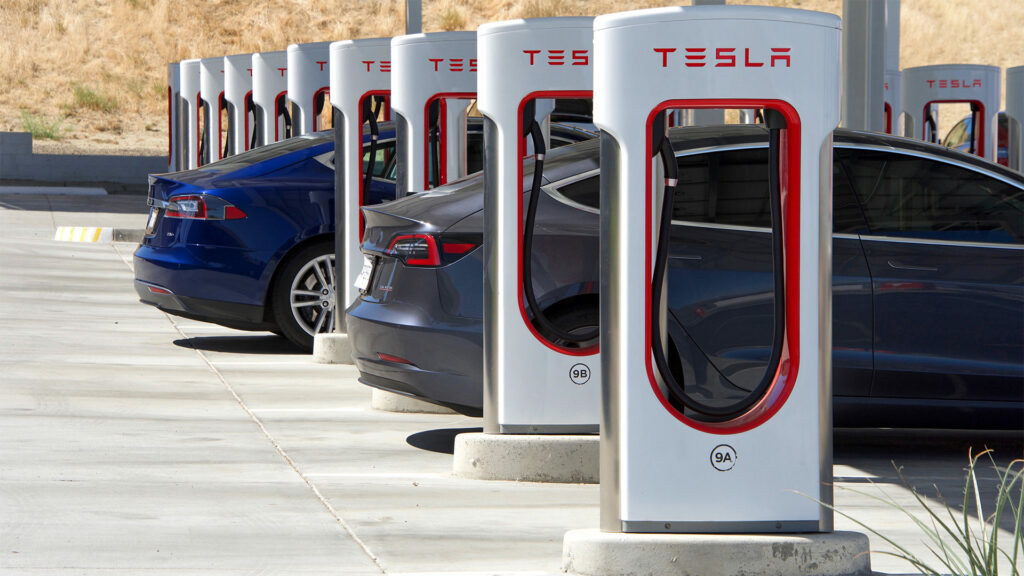Tesla's shares experienced a notable surge, closing 4% higher on Friday, following the announcement that General Motors (GM) had joined Ford in adopting Tesla's electric-vehicle (EV) charging network. Analysts predict that this partnership could establish Tesla Superchargers as the primary charging network in the United States. The collaboration between three of the largest US automakers guarantees that over 60% of the country's EV market will have access to Tesla's North American Charging Standard (NACS).
In a recent candid interview between Ford CEO Jim Farley and Robert Llewellyn, the discussion touched on Volkswagen's challenges in the software field. Farley explained that Ford's initial efforts in the EV market were hindered by ‘traditional car maker thinking', which resulted in relying on close to 150 product modules from different suppliers, each with their own software stacks and proprietary intellectual property. This fragmented approach is preventing Ford from taking real control of its own EV production. The interview highlighted the importance of a unified approach to software development and standardisation in the EV industry.
Here at WhichEV, we have long said that EVs are closer in principal to computer products than traditional cars. Everything is focused on the core program and software stack. If you are reliant on getting 150 external developers to work together to a common standard – then you are inviting chaos and cost.
The same could be said for charging infrastructure.
The partnership between Tesla, Ford, and GM is a significant step toward unifying the charging infrastructure. The White House also expressed support by stating that electric-vehicle charging stations using Tesla standard plugs would be eligible for federal subsidies if they included the US charging standard connection, CCS. Tesla aims to meet this requirement by developing CCS adapters, which would enable it to qualify for federal tax incentives. Garrett Nelson, senior investment strategist at CFRA Research, commented that Tesla's move to open up its Supercharger network to competitors could negatively impact third-party charging companies.
Shares of independent charging companies, such as ChargePoint, EVgo, and Blink Charging – experienced a decline, with their stock prices closing between 11% and 13% lower. Wedbush Securities estimated that Ford and GM's adoption of the Tesla charging network could generate approximately $3 billion in revenue for Tesla's charging services over the next few years. In response, the brokerage raised its price target for Tesla stock to $300, representing a nearly 30% increase from its previous closing price.
Elon Musk-led Tesla has witnessed a remarkable increase in its market value, adding around $190 billion since announcing the charging partnership with Ford on May 25. The company's stock has recorded gains for eleven consecutive sessions, marking its longest winning streak in two and a half years. During trading hours, Tesla was among the most traded stocks across US exchanges.
While Tesla's stock has a forward 12-month price-to-earnings ratio of 60.46, one of the highest in the S&P 500 index, it far surpasses GM's ratio of 5.29 and Ford's ratio of 7.94, indicating the market's confidence in Tesla's future prospects.
GM CEO Mary Barra expressed optimism about the potential of the NACS, stating that “We have a real opportunity here to really drive (the NACS) to be the unified standard for North America, which I think will enable even more mass adoption.” Both GM and Ford experienced modest gains, with their shares closing up over 1% on Friday.
As Tesla's charging network gains traction, other companies will face pressure to upgrade their networks to be compatible with Tesla's standards. Many companies currently struggle with customer service and lack the financial resources to make such investments. Blink Charging, a notable charging company, welcomes the opportunity to collaborate with Tesla on interoperability with cables and connections.
Danni Hewson of AJ Bell noted that Tesla's proactive approach has given them an advantage in the charging business, making it challenging for other operators to catch up. Hewson believes that the charging business could become a significant growth driver for Tesla.
However, Michael Austin, senior research analyst at Guidehouse, points out that increased usage of Tesla Superchargers may create challenges for the company. There is a risk of stations becoming overcrowded, potentially disappointing Tesla owners, or diluting the competitive advantage of having exclusive access to the best network.
As the partnership between Tesla, Ford, and GM takes shape, it sets the stage for a transformative shift in the EV market. With Tesla Superchargers potentially becoming the industry standard, the charging infrastructure is poised for significant advancements, which will benefit EV owners across the United States.
